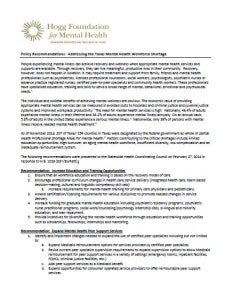Policy Recommendation: Addressing the Texas Mental Health Workforce Shortage
Introduction
People experiencing mental illness can achieve recovery and wellness when appropriate mental health services and supports are available. Through recovery, they can live meaningful, productive lives in their community. Recovery, however, does not happen in isolation. It may require treatment and support from family, friends and mental health professionals such as psychiatrists, licensed professional counselors, social workers, psychologists, psychiatric nurses or advance practice registered nurses, certified peer-to-peer specialists and community health workers. These professionals have specialized education, training and skills to serve a broad range of mental, behavioral, emotional and psychosocial needs.
The individual and societal benefits of achieving mental wellness are obvious. The economic value of providing appropriate mental health services can be measured in avoided costs to hospitals and criminal justice and juvenile justice systems and improved workplace productivity. The need for mental health services is high. Nationally, 46.4% of adults experience mental illness in their lifetime and 26.2% of adults experience mental illness annually. On an annual basis, 5.8% of adults in the United States experience a serious mental illness. Nationwide, only 39% of persons with mental illness receive needed mental health treatment.
As of November 2013, 207 of Texas’ 254 counties in Texas were designated by the federal government as whole or partial Health Professional Shortage Areas for mental health. Factors contributing to the critical shortages include limited education opportunities, high turnover, an aging mental health workforce, insufficient diversity, low compensation and an inadequate reimbursement system.
The document available for download includes the recommendations that were presented to the Statewide Health Coordinating Council on February 27, 2014 in response to H.B. 1023 (83rd/Burkett).

